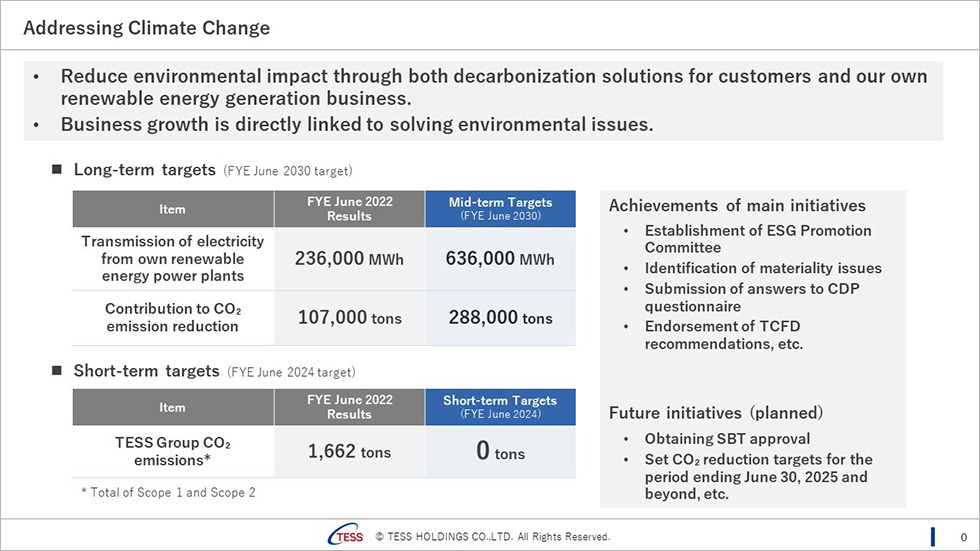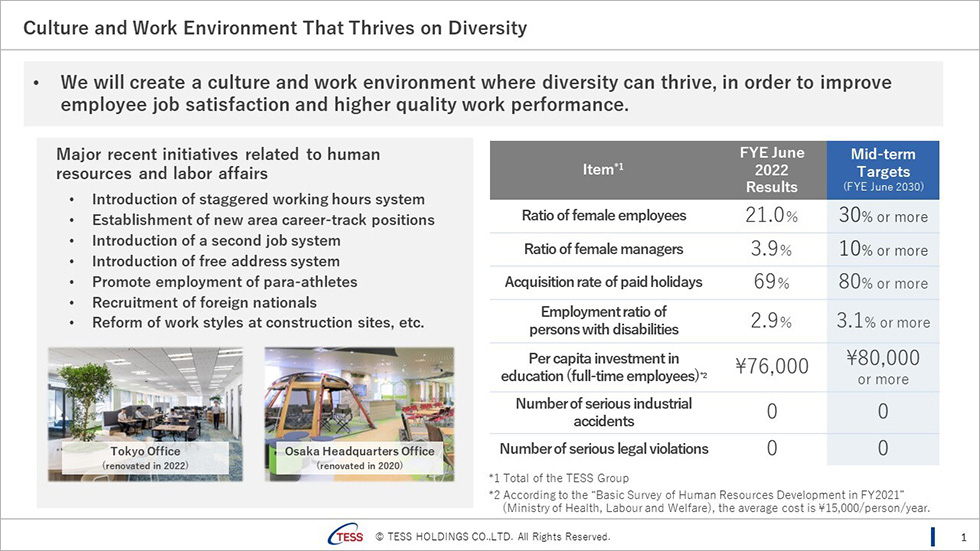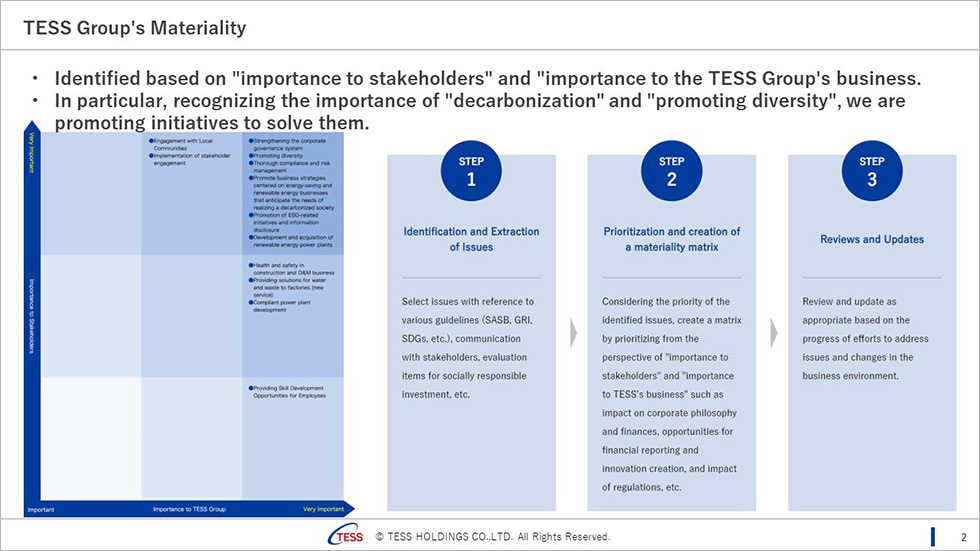Sustainability


The 1st Stakeholder Dialogue(June 2023)
【Outline】
At the first dialogue held in June 2023, we invited three external experts to give their opinions mainly on the TESS Group's business activities, materiality, and ESG-related initiatives such as climate change countermeasures and diversification of human resources including female advancement.
Mr. Yamagishi of the World Wide Fund for Nature Japan (WWF Japan) also gave a keynote speech on the theme of climate change and biodiversity.
Ms. Noda of Veolia Japan K.K. and Mr. Hamamoto of Mitsui Fudosan Co., Ltd. also introduced their companies' perspectives on ESG and their specific initiatives.
【Attendees】
【External experts】
-

- Mr. Naoyuki Yamagishi
- Director, Conservation Division
Chief Conservation Officer
World Wide Fund for Nature Japan (WWF Japan)
-

- Ms. Yumiko Noda
- Representative Director
Veolia Japan K.K.
-

- Mr. Wataru Hamamoto
- Managing Director
Mitsui Fudosan Co., Ltd.
【TESS Holdings Co., Ltd.】
- ●Director and Chairman, Chairperson of the Board of Directors:Hideo Ishiwaki
- ●Representative Director and President:Kazuki Yamamoto
- ●Executive Managing Director:Toshihiro Takasaki(President & Chief Executive Officer of TESS Engineering Co., Ltd.)
- ●Director, In-charge of ESG and Women's Empowerment:Mayumi Yoshida(Chairman of the ESG Promotion Committee)
- ●Director, In-charge of ESG of TESS Engineering Co., Ltd.:Tsutomu Watari*(Vice Chairman of the ESG Promotion Committee)
- ●Director, Audit and Supervisory Committee Member:Katsushige Fujii*
- ●External Director, Audit and Supervisory Committee Member:Hiroyuki Okura*
- ●External Director, Audit and Supervisory Committee Member:Masaki Inoue*
- ●External Director, Audit and Supervisory Committee Member:Akio Hamamoto
- ●ESG Promotion Committee Secretariat:Kengo Makino
- ●ESG Promotion Committee Climate Change Working Group:Hinano Mizuta
- ●ESG Promotion Committee Diversity & Inclusion Working Group:Hiroki Matsumoto*, Ena Kawashima
- ●Observer Participation:Yoshihiro Matsumoto*, Shoko Nakamura*, Airi Asada
- *Online Participation
【Exchange of opinions with external experts】
Initiatives to Combat Climate Change
TESS Holdings(THD): From the fiscal year ending June 2022, the TESS Group has started aggregating Scope 1 and 2 GHG emissions and reporting to the CDP, and has disclosed information based on the TCFD recommendations. From the fiscal year ending June 2023, we have also started compiling Scope 3 GHG emissions.
As the TESS Group's main business is to help customers decarbonize their businesses, what are the most important aspects of GHG emissions reduction and information disclosure that you should focus on in the future?

WWF Japan Yamagishi: We should consider how much difference there is between the scientifically desirable level of greenhouse gas (GHG) emissions reduction that is said to be ideal for the world and the level that the TESS Group can realistically accommodate, and whether it is possible to strive for a higher level.
For example, in order to be certified as an SBT, it is necessary to reduce emissions by an annual rate of 4.2% or more. I think it would be a good idea to first check whether this point can be achieved.
Scope 3 GHG emissions should be calculated properly, but I think there are some aspects that are worth the cost. In other companies' case studies, surveys on GHG emissions, etc., were steadily conducted among suppliers and vendors from the early stages of the project, and communication through these surveys gradually led to requests for specific measures. It is also important for business partners and suppliers to get accustomed to Scope 3 aggregation, so I think it will be important to accumulate steady efforts.
Initiatives related to biodiversity
THD: The TESS Group develops and operates solar and biomass power plants in Japan, and overseas, it is engaged in the export business of PKS (*1) and the research and development of EFB (*2) pellets in Indonesia. In this context, what kind of fields and to what extent does society expect biodiversity to be addressed?
WWF Japan Yamagishi: One important thing to be mindful of in the development of domestic power plants and other facilities in Japan is the need to gather as much information as possible about the uniqueness of biodiversity in the development areas. In most cases where issues arise domestically, it is because development is carried out without considering the local context. Therefore, it is necessary to start by collecting information about biodiversity.
Among the goals of the "Kunming-Montreal Biodiversity Framework (GBF)" adopted in 2022, is a "30 by 30" goal to conserve more than 30% of land and sea areas by 2030. In the future, I believe that more and more land will be designated as national parks and will be incorporated into areas where biodiversity is being conserved through private initiatives such as natural symbiosis sites. I think that it is better to pay particular attention to whether biodiversity in the vicinity of such areas is being violated.
Regarding PKS and EFB, I think it would be good to reconfirm the GHG protocol. If you say that the use of PKS and EFB is leading to GHG emissions reductions, we should look at the consistency with the rule, as it opens up the possibility that we will be asked to prove how the carbon in the area where the PKS or EFB is caught or originally generated is changed.
(*1) PKS(Palm Kernel Shell):
The leftover shell after extracting palm oil from the seeds of the palm tree is called palm kernel shell.
(*2) EFB(Empty Fruit Bunch):
Empty palm fruit clusters that are a by-product (residue) of palm oil extraction.
Initiatives to Address Human Rights Issues in the Supply Chain
THD: To what extent should human rights issues and human rights due diligence be addressed in the supply chain when developing businesses related to the circular economy that effectively utilize EFB in Indonesia?
Veolia Japan Noda: For example, in procurement, we check the compliance of new suppliers with the Universal Declaration of Human Rights, labor laws, and environmental laws. We do not make decisions based solely on cost, but rather on whether the product meets the standards required by our group in terms of human rights and the environment. Our group also operates five biomass power plants, four of which use resources that would otherwise be discarded locally as fuel. We are working on biomass while considering both human rights and the environment. It may be necessary for your company to communicate steadily with your suppliers and business partners regarding human rights, and to do business with companies that understand your company's policies.
Initiatives Related to the Promotion of Women's Activities
THD: In the future, I think it is necessary to gradually increase the number of women who are suitable for technical positions in engineering and maintenance departments, not just in the administrative division, where there are currently many female key career-track employees. Especially in technical positions, I feel that there is a tendency for women to be rigorously selected in order to promote the appointment of women for key career-track positions, such as whether they have the same abilities as men in technical positions, whether they can work the same hours, and so on. If a woman has the aptitude and ambition, we may choose to give her an opportunity and promote her with the expectation that she will grow in the future. However, in this case, I think that there will be opinions that "men and women should be equal, isn't it reverse discrimination?" How should we proceed to increase the number of female key career-track employees throughout the TESS Group?

Veolia Japan Noda: First, we believe it is important to secure a certain number of women. If they remain in the minority, women are uncomfortable and men do not know how to treat them, and the vicious cycle cannot be broken. When the minority ratio reaches about 30%, it becomes the norm. Therefore, I feel that it is important to take the initiative in appointing women until a certain number is reached.
In our group, the percentage of female managers was around 4% in 2017, but last year it was around 11%. I believe this is the result of our efforts to give preference to female candidates as much as possible in the appointment process. It is important for the top management to exercise strong leadership. In addition, it is important for the message from the top to permeate through leaders at all levels.
Also, for example, in order to absorb the anxieties and worries of women working in the field (such as lack of restrooms and places to change clothes), I created a women's network called Tsubaki. In addition to creating a place where women can easily express their opinions, we support women's active participation by exchanging opinions with women's networks outside the company.
Mitsui Fudosan Hamamoto: When given an opportunity or challenge, men tend to have high self-esteem and say "I can do it" and try to seize it, while women tend to have low self-esteem and shy away, saying "I don't have that level of ability or confidence yet. I think it is necessary to take these characteristics into account.
Veolia Japan Noda: It is true that there are few female role models for managerial positions, and some women hesitate to be promoted because they think it will be difficult to become a manager. However, sometimes she actually lives up to your expectations if you let her. Isn't it necessary to "try" first?
Issues in Selecting Nadeshiko Brands, etc.
THD: This is a question for Mr. Hamamoto. Your company has been selected as a “Nadeshiko Brand” for two consecutive years, and has been selected for the “MSCI Japan Empowering Women Index (WIN)” for four consecutive years. What challenges have you faced along the way, and what did you find most challenging?
Mitsui Fudosan Hamamoto: First, I feel that top leadership is extremely important in the promotion of women's activities. If it is not actively promoted under the leadership of top management, the organization will soon revert to its original state because of the comfort of being in a highly homogeneous group.
Also, there is definitely an effect of diversity. At our company, there are cases where female employees have started offering services and customer considerations that would never have been conceived of by men alone, and have been well received.
When working on the "Nadeshiko Brand," we received opinions from women, such as, "Why are only women prioritized? I don't want men and women to be separated." I think the most difficult thing was how to adjust the opinions of both sides, as similar opinions came out from men.
What we have sensed in our efforts to date is that women, in particular, are many times more powerful when they come together than when they work individually. Therefore, we believe that it is important how to create such an environment, and how top management can thoroughly take the lead in doing what can be done, such as promotiong and presenting role models and developing case studies of other companies within the company.
Materiality (Important Issues) of the TESS Group
THD: Regarding the materiality identified by the TESS Group, could you give us your candid opinions and suggestions regarding matters that you think are missing and evaluations of the degree of importance?

Veolia Japan Noda: I think it would be good to have a section on biodiversity.
WWF Japan Yamagishi: I think that matters related to biomass could be materiality. Also, you have already identified "compliant power plant development" as a materiality, but I think it is important to note that there are some cases, especially in other countries, where just because something is legal and recognized by the government does not mean it is sustainable.
Mitsui Fudosan Hamamoto: Since the current materiality is exhaustive, I feel that there should also be shades of granularity for each item. The term "promotion of diversity" is lumped together, but it may be necessary to be more specific about what diversity is to be promoted, etc. I felt that there was a difficulty in how to convey this materiality to external stakeholders and employees.
Expectations for the TESS Group
THD: This is a question for Mr. Hamamoto. From the perspective of a potential TESS Group customer such as yourself, what are your expectations of a company like TESS Group that offers solutions for decarbonization?
Mitsui Fudosan Hamamoto: Regarding our efforts towards decarbonization, we are also reflecting and considering while actively taking action. For that reason, I feel that it is necessary to build a relationship that allows us to continue to work together while constantly thinking about what we can do.


